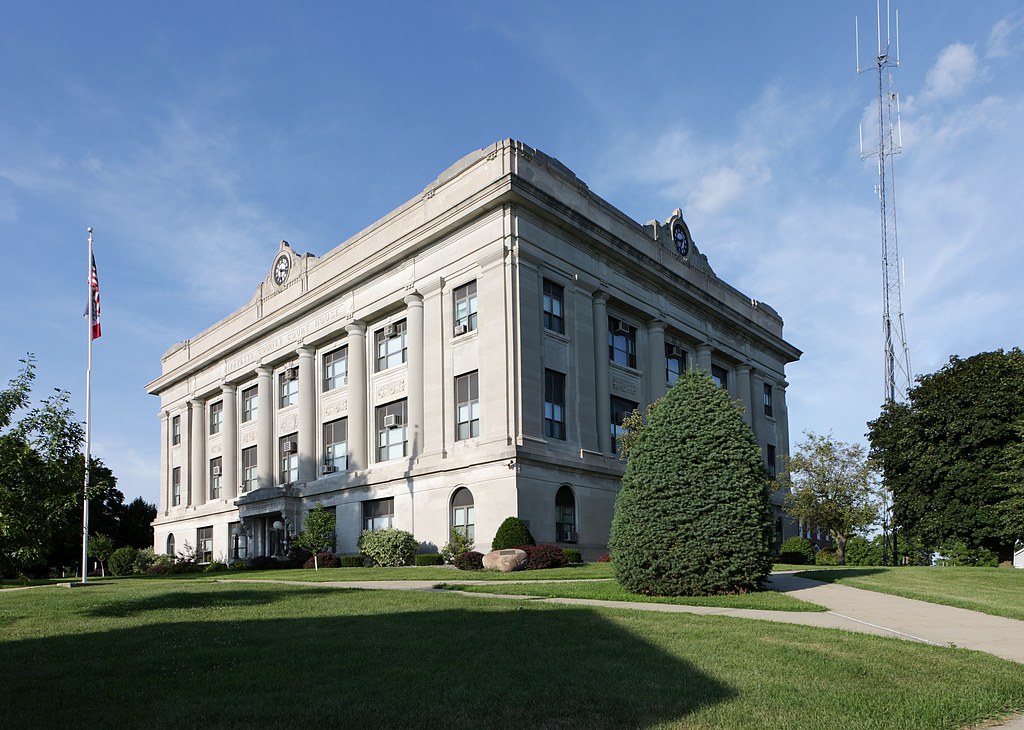
Serving the Citizens of Fayette County Since 1850
Fayette County’s first Sheriff was George W. Neff. Sheriff Neff served from 1850-1852.
The first homicide in Fayette County occurred on October 20th, 1861. On the evening of the 20th, George Ostrander arrived at a neighbor’s house stating that a cow had killed his wife, while she was milking. The neighbor suspected foul play and summoned the Constable. Upon arrival at the Ostrander farm, one of the children told about seeing his father strike his mother in the head with an axe. There had been domestic problems within the Ostrander family in the past. A possible motive for the murder was that Ostrander had purchased some land and had deeded the land to his current wife, and fearing that his previous wife would demand a portion of his land. However, he now had his eye on a third wife, and his second wife was unwilling to divide the property with him.
Fayette County’s first jail was built in the northwest corner of the courthouse in 1866, with the inner walls being constructed of oak boards. The first jail break for the county was in 1872, when James Thompson a/k/ a Benson, escaped from the cell by setting fire to the wood around the stove pipe hole until it was large enough for him to crawl through. Thompson’s method of escape resulted in the destruction of the courthouse, as the courthouse itself caught on fire during the escape. Upon Thompson’s capture, four or five days later, he denied any intention of destroying the courthouse. The next jail was built in 1882, and included a residence for the Sheriff. The jail and Sheriff’s house were condemned in 1908. The current jail was built in 1909, using the cells from condemned jail. This jail was used until 1982, when it was closed due to changing jail standards. The current jail reopened in 1987, and most of the work to reopen it was done by the Sheriff and his Deputies. The old Sheriff’s residence was converted into offices.
Regrettably, Fayette County has lost one officer in the line of duty. On September 7, 1882, Constable Marion Shephard, Deputized by Sheriff Farr, was sent to Wadena to arrest Bill and Ike Barber for the theft of a horse and buggy. Shephard approached the brothers to make an arrest and was shot twice in the chest, and was fatally wounded by Ike Barber. The Barber brothers were not arrest until almost a year later in Bremer County. They were later busted out of Bremer County jail, and hung by a lynch mob. Marion Shephard’s name is on the National Monument in Washington D.C., honoring officers killed in the line of duty.
Fayette County has also had one execution in its history. Henry Schmidt, age 18, was hung on January 13th, 1888 after being charged with murder in the first degree. He was responsible for the deaths of Lucretia Peek and Abram Peek. On the night of September 4, 1886, Abram Leonard stayed overnight with Mr. And Mrs. Peek. Leonard and the Peeks were awakened around midnight by the sound of gunshots. Leonard was struck by one of the bullets but survived. Abram Peek was bludgeoned to death and Lucretia Peek was shot in the head. She survived for 15 days, identifying Henry Schmidt as the man who shot her. According to Schmidt’s confession, Elison T. Smith had hired him to kill Abram Leonard for $500.00. Smith and Leonard had had a disagreement over land that Smith had deeded to Leonard.
C.C. Wright was the Sheriff of Fayette County from 1917 to 1927. Fifty-eight years later, his great grand-daughter, Candace Wright became one of Fayette County’s first full-time dispatchers.
Fayette County Sheriff A. J. Kutschat and Clayton County Sheriff Carlson organized Iowa Peace Officers Association. Kutschat served as Fayette County Sheriff from 1939 to 1947.
During Sheriff Norm McCauley’s term, 1968 to 1985, Fayette County was the first county in Iowa to use a high band radio. They began using the radio in 1975. We would like to issue a special thanks to the Fayette County Historical Society, whose assistance made this history possible.
The Sheriffs of Fayette County
- 1850-1852: George W. Neff
- 1852-1853: Henry C. Lacy
- 1853-1855: Hiram W. Earll
- 1855-1859: Jerome Boswell
- 1860-1861: J.J. Welsh
- 1862-1863: Charles Sawyer
- 1864-1867: James F. Babcock
- 1868-1871: Jacob Swank
- 1872-1873: C.H. Dorland
- 1874-1875: Hiram B. Capwell
- 1876-1877: J.J. Welsh
- 1878-1884: L.L. Farr
- 1884-1888: O.E. Taylor
- 1888-1890: Henry O'Neil
- 1890-1896: H. R. O'Neil
- 1896-1900: A.L. Hockings
- 1900-1904: J.D. Finch
- 1904-1909: C.L. Culver
- 1909-1914: Ed R. Clark
- 1914-1917: R.F. Dewey
- 1917-1927: C.C. Wright
- 1927-1932: Alva A. Robertson
- 1932-1938: Hank Nuhring
- 1938-1947: Art J. Kutschat
- 1947-1969: Fred House
- 1969-1985: Norman McCauley
- 1985-1989: Stanley C. Kuch
- 1989-1997: Eugene H. Dietzenback
- 1997-2000: Virgil Smith
- 2000-Present: Marty Fisher